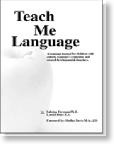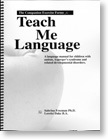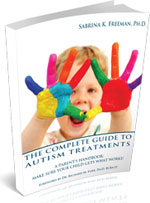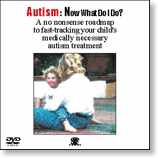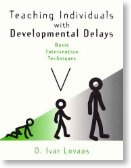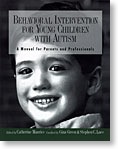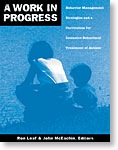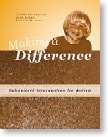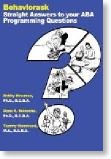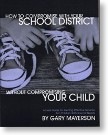parents
You know you’re the parent of a child with autism when you instinctively do a mental checklist for autism on every baby you meet!
21/11/12 15:48 Filed in: autism
I’ve noticed a behavior that I cannot avoid. Every time I encounter a young baby or toddler in a public place, I instantly go into diagnostic mode, paying attention to every detail of the baby’s reciprocal interaction with a stranger i.e., Me!
It’s a reflexive habit, and quite impossible to stop. Once that baby makes eye contact with me, and starts the unmistakable, non-verbal exchange with me, so happy that someone is paying attention, I relax. When that baby actually tries to get my attention, I stop staring and move on. The diagnosis is done. The kid passes the test.
I’m still able to hold myself back and refrain from reporting my findings to the unsuspecting parent. Let’s hope that lasts!
It’s a reflexive habit, and quite impossible to stop. Once that baby makes eye contact with me, and starts the unmistakable, non-verbal exchange with me, so happy that someone is paying attention, I relax. When that baby actually tries to get my attention, I stop staring and move on. The diagnosis is done. The kid passes the test.
I’m still able to hold myself back and refrain from reporting my findings to the unsuspecting parent. Let’s hope that lasts!
George Will hits one out of the ballpark
07/05/12 20:14 Filed in: autism | Asperger's Syndrome
Although I don’t follow Washington Post columnist George Will on a regular basis, and I don’t know him personally, his recent article which celebrates the birthday of his 40 year old son born with Down Syndrome, makes me feel like he and I are in the same exclusive club: determined and tenacious parents of children with a disability. The disabilities are different, each with their own challenges; we are a generation apart, but the orientation is the same. We want to make sure that our children have a meaningful life that is lived with dignity and that they reach their full potential.
What is interesting, though, is that Will describes parents of children with Down Syndrome as not having “any tormenting sense of what might have been” since Down Syndrome is apparent from birth. That is clearly different from parents of children with autism since autism is not obvious from birth and, indeed, most of us do have a tormented sense of a future that is not to be. After two to three years living with a baby who we expect will grow up to be a typically developing adult, we discover that our child is not developing on a typical trajectory and will need thousands of hours of treatment (and hundreds of thousands of dollars) to learn the most basic of skills. Our torment may be quite functional, though, since it motivates us to fight for effective autism treatment with the hope that our children will improve, perhaps to the point where they may, some day, become indistinguishable from their typically developing peers.
George Will also describes a world that would be better if there were more people with Down Syndrome, due to their socially pleasant demeanor. Like children with Down Syndrome, children with autism also introduce society to opportunities for everyone to challenge their own sense of acceptance or tolerance. Yet children with autism provide a greater challenge since they are not naturally sociable. In fact, our kids regularly break societal norms and often need to be taught a considerable number of social conventions. Will further mentions that 90% of fetuses with Down Syndrome are now aborted due to our societal obsession with perfection. As we become more knowledgeable about what causes autism, I fear that in the race for perfection, there may be the same rate of abortion of children with autism who are diagnosed in the womb.
What garners respect for Dr. Will is his unqualified, public pride in his son as he highlights the meaningful life that his son enjoys. It is heartwarming that when Jon Will independently negotiates public transit to spend his days enjoying life, sitting in the stadium rooting for his favorite baseball team he is truly an equal. At the end of the day, a happy, independent life is the ultimate goal we have for our disabled children as well.
What is interesting, though, is that Will describes parents of children with Down Syndrome as not having “any tormenting sense of what might have been” since Down Syndrome is apparent from birth. That is clearly different from parents of children with autism since autism is not obvious from birth and, indeed, most of us do have a tormented sense of a future that is not to be. After two to three years living with a baby who we expect will grow up to be a typically developing adult, we discover that our child is not developing on a typical trajectory and will need thousands of hours of treatment (and hundreds of thousands of dollars) to learn the most basic of skills. Our torment may be quite functional, though, since it motivates us to fight for effective autism treatment with the hope that our children will improve, perhaps to the point where they may, some day, become indistinguishable from their typically developing peers.
George Will also describes a world that would be better if there were more people with Down Syndrome, due to their socially pleasant demeanor. Like children with Down Syndrome, children with autism also introduce society to opportunities for everyone to challenge their own sense of acceptance or tolerance. Yet children with autism provide a greater challenge since they are not naturally sociable. In fact, our kids regularly break societal norms and often need to be taught a considerable number of social conventions. Will further mentions that 90% of fetuses with Down Syndrome are now aborted due to our societal obsession with perfection. As we become more knowledgeable about what causes autism, I fear that in the race for perfection, there may be the same rate of abortion of children with autism who are diagnosed in the womb.
What garners respect for Dr. Will is his unqualified, public pride in his son as he highlights the meaningful life that his son enjoys. It is heartwarming that when Jon Will independently negotiates public transit to spend his days enjoying life, sitting in the stadium rooting for his favorite baseball team he is truly an equal. At the end of the day, a happy, independent life is the ultimate goal we have for our disabled children as well.
Memo to Huffington Post: autism treatment is about kids, not parents
10/04/12 19:10 Filed in: autism | Asperger's Syndrome
In recognition of Autism Awareness month, the Huffington Post printed an article called 10 Things To Do After an Autism Diagnosis. The author -- Hannah Brown -- gives advice to parents on what they should do after the autism diagnosis bombshell is dropped on them. Although I applaud the helpful sentiment, ninety percent of the advice given by Brown was to parents about their own mental health and coping mechanisms and not about how to help their child.
To illustrate, although taking valium may help a parent cope, and making sure that one’s name is on all joint assets may be helpful in the event a spouse leaves the relationship, these things do nothing for the child. However, if the parent takes effective steps to improve their child’s situation, valium will be needed less and the marriage will likely be more harmonious. Life would be less stressful and something that together, as a team, the family unit can better withstand. Here are my “10 Things to Do After the Diagnosis”:
1) Find a parent group in your area that supports science-based treatment which is, currently, Early Intensive Behavioral Treatment (EIBI) based on the principles of Applied Behavior Analysis (ABA).
2) Join the Me-List on FACEBOOK and the Me-List on Yahoo. Both these groups are comprised of parents worldwide who have treatment teams up and running.
3) Find out if you live in a region where insurance companies are required to provide coverage for EIBI autism treatment. Find how parents in your region are funding their children’s treatment programs.
4) Source a list of Behavioral Consultants in your region with expertise in EIBI. If you don’t have any local expertise, here are a few national companies.
5) Phone the Behavioral Consultants you find and have them provide three references from parents who use their services. If they won’t give you references, go to the next consultant on your list. There is a certification board for this group of professionals and you can find them in your search, via zip code; however, make sure that their expertise is autism.
6) Once you hire the Behavioral Consultant, start recruiting for your treatment team.
7) Set up a training session for your team and start your program. The first couple of weeks are somewhat of a shock, but then you’ll get into a routine.
8) Start reading the right books. I have a list on the Autism Pundit bookshelf.
9) Sign-up for the Association for Science in Autism Treatment’s Newsletter and get savvy about how to differentiate science from quackery!
10) Breathe. If you follow the above steps, your child will reach his or her potential, and you have no idea how great that potential may be!
As a parent who has been in the autism universe for over two decades, I’m of the view that these steps are going to get you where you need to go. For now, ignore all the other noise out there. Your job is to get your child into a treatment program A.S.A.P. Nothing else will matter until your child has access to high quality treatment.
To illustrate, although taking valium may help a parent cope, and making sure that one’s name is on all joint assets may be helpful in the event a spouse leaves the relationship, these things do nothing for the child. However, if the parent takes effective steps to improve their child’s situation, valium will be needed less and the marriage will likely be more harmonious. Life would be less stressful and something that together, as a team, the family unit can better withstand. Here are my “10 Things to Do After the Diagnosis”:
1) Find a parent group in your area that supports science-based treatment which is, currently, Early Intensive Behavioral Treatment (EIBI) based on the principles of Applied Behavior Analysis (ABA).
2) Join the Me-List on FACEBOOK and the Me-List on Yahoo. Both these groups are comprised of parents worldwide who have treatment teams up and running.
3) Find out if you live in a region where insurance companies are required to provide coverage for EIBI autism treatment. Find how parents in your region are funding their children’s treatment programs.
4) Source a list of Behavioral Consultants in your region with expertise in EIBI. If you don’t have any local expertise, here are a few national companies.
5) Phone the Behavioral Consultants you find and have them provide three references from parents who use their services. If they won’t give you references, go to the next consultant on your list. There is a certification board for this group of professionals and you can find them in your search, via zip code; however, make sure that their expertise is autism.
6) Once you hire the Behavioral Consultant, start recruiting for your treatment team.
7) Set up a training session for your team and start your program. The first couple of weeks are somewhat of a shock, but then you’ll get into a routine.
8) Start reading the right books. I have a list on the Autism Pundit bookshelf.
9) Sign-up for the Association for Science in Autism Treatment’s Newsletter and get savvy about how to differentiate science from quackery!
10) Breathe. If you follow the above steps, your child will reach his or her potential, and you have no idea how great that potential may be!
As a parent who has been in the autism universe for over two decades, I’m of the view that these steps are going to get you where you need to go. For now, ignore all the other noise out there. Your job is to get your child into a treatment program A.S.A.P. Nothing else will matter until your child has access to high quality treatment.
Parents as autism therapists - a morally bankrupt policy!
28/02/12 18:45 Filed in: autism | Asperger's Syndrome
This week I read yet another article where government attempts to ration health care for children with autism. When will there be a generally accepted expectation in society that children with autism actually have the right to receive professional treatment for their affliction?
The bogus legitimacy given to the “parent as therapist” model has been around for a long time. The logical allure for government is to have policy makers conscript free parent labor as this saves governments and health insurance companies money. Savvy parents have understood this dynamic and have fought to have professionalism brought to autism treatment. Many have insisted on the use of board certified behaviorists with expertise in autism.
In the case of the parents referenced in the article, the government efforts have met with success. Parents have completed a course that the reporter calls “innovative” because parents of children with autism can graduate with a course certificate after having been taught by a nurse with only a minimal background in behaviorism! The fact that these parents are so thrilled with a course that teaches them very basic tools to deal with their children with autism is disturbing since that means that they are getting no professional treatment for their child’s condition. Imagine if parents of children with cancer took classes from nurses on how to treat their child’s cancer! This would be considered scandalous, but where autism is concerned, the children of a lesser god can be denied professional care, be offered “good enough” and reporters cheer! Parents, your children deserve better!
The bogus legitimacy given to the “parent as therapist” model has been around for a long time. The logical allure for government is to have policy makers conscript free parent labor as this saves governments and health insurance companies money. Savvy parents have understood this dynamic and have fought to have professionalism brought to autism treatment. Many have insisted on the use of board certified behaviorists with expertise in autism.
In the case of the parents referenced in the article, the government efforts have met with success. Parents have completed a course that the reporter calls “innovative” because parents of children with autism can graduate with a course certificate after having been taught by a nurse with only a minimal background in behaviorism! The fact that these parents are so thrilled with a course that teaches them very basic tools to deal with their children with autism is disturbing since that means that they are getting no professional treatment for their child’s condition. Imagine if parents of children with cancer took classes from nurses on how to treat their child’s cancer! This would be considered scandalous, but where autism is concerned, the children of a lesser god can be denied professional care, be offered “good enough” and reporters cheer! Parents, your children deserve better!


